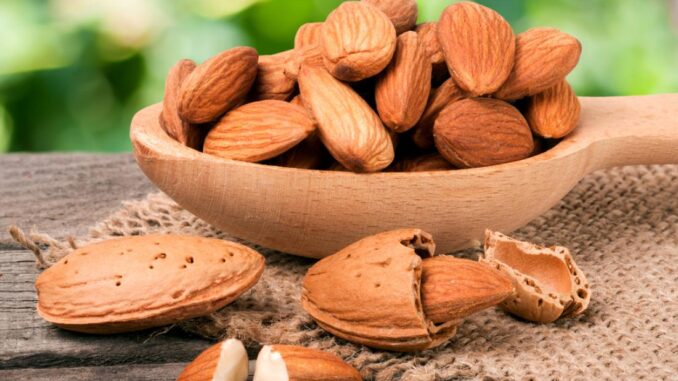
I find almonds to be one of the best additions to a weight-loss diet. They are a rich source of nutrients like vitamins, minerals, protein, and healthy fats.
They taste amazing and can be eaten as a snack or added to smoothies, gravies, and desserts. As a nutritionist, I often recommend smoothies made with almond milk to those who are allergic to dairy. Almond flour can be used in baking to make cookies, pie crusts and so much more.
From reducing wrinkles to improving heart health and boosting weight loss, almonds have numerous health benefits.
1. Almonds are Rich in Vitamin E
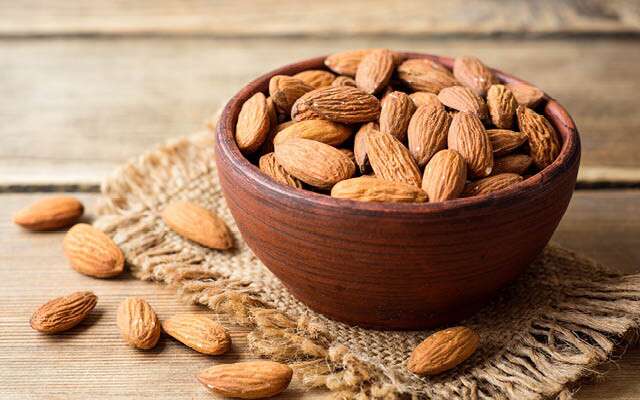
Almonds are an abundant source of vitamin E. An ounce of almonds has 7.3 mg of vitamin E. 100 grams of almonds can offer you 171% of your daily vitamin E requirements.
The vitamin E found in almonds has a positive impact on the levels of cognition among the elderly.
The rate of cognitive decline reduces noticeably with a higher intake of vitamin E. According to research, a 36% reduction was noted in the rate of cognitive decline in those with high vitamin E consumption in comparison with those with the lowest (1).
Summary: Vitamin E slows down the rate of cognitive decline, even among aged people.
2. Almonds have Antioxidant Power
The vitamin E in almonds is known to have potent antioxidant properties. These antioxidants protect your cells from oxidative damage, thus slowing down aging and reducing the risk of diseases such as heart disease and cancer.
Almonds have been found to help lower the levels of biomarkers associated with smoking.
Researchers noted that the intake of almonds decreased oxidative stress among men who smoked. The study was done using 60 men (18 to 25 years) who smoked 5 to 20 cigarettes a day (2).
Summary: Almonds contain antioxidants. These can even reduce biomarkers of oxidative stress in smokers.
3. The Effect of Almonds on Cardiovascular Diseases

Eating almonds not only reduces your bad cholesterol levels but also increases your response to insulin. This helps regulate your blood glucose levels.
A 2010 study evaluated whether adding almonds to the diet improved insulin responsiveness and other cardiovascular risk factors among adults with prediabetes (3).
Taking 2 ounces of almonds per day, for16 weeks was found to reduce insulin resistance and beta-cell function. A significant decline in LDL(bad cholesterol) was also observed in those who ate almonds daily.
Summary: A diet rich in almonds improves insulin sensitivity in prediabetic people. LDL levels also show a noteworthy decline with almond intake.
4. Appetite Control with Almonds
Snacking forms a major portion of our daily food intake. Almonds are a nutrient-rich and satiating natural food.
A 2013 study examined the effects of almonds as a common snack food item (4). They investigated the influence of almonds on blood glucose after snacking, appetite, short-term body weight, and fasting blood parameters when taken with meals or as a separate snack.
137 participants, with a high risk of type 2 diabetes, took 43 grams of almonds a day, as a morning or afternoon snack or with their meal.
It was noted that their blood glucose levels were lower in postprandial tests compared to those who did not have almonds as snacks. These people also reported reduced levels of hunger and food cravings.
Summary: The study concluded that almonds serve post-ingestive metabolic appetite benefits. The almond snacking did not raise the risk of weight gain. The study indicates that almond snacking is a healthy dietary option.
5. Weight Loss Benefits of Almonds

Although almonds are high in fat and calories, it is considered a weight-loss-friendly food. However, you should be careful not to binge eat on these.
A fistful of almonds makes a healthy and satiating snack. This is a much better choice than mindlessly munching on high-sugar foods, cookies, or salty processed chips.
In a 24-week trial, a group of people following an almond-enriched low-calorie diet lost much more weight in comparison to the group on a low-calorie diet with complex carbs (5). Their total calorie and protein intake remained the same.
The first group had 84 grams of almonds daily which gave them a higher intake of high monounsaturated fats (MUFA). Their total fat intake was at 39% total fat with 25% MUFA, and 32% carbohydrate while the other group had 18% total fat, 5% MUFA, and 53% carbohydrate. Despite the higher fat intake, the almond group lost 62% more weight!
In another study, women consuming nuts were found to lose more weight than those who didn’t eat nuts.
Summary: Although a high calorie food, almonds promote weight loss when eaten in moderation as part of a low calorie diet. Almonds are a satiating snack that helps overcome food cravings.
6. Almond Influences Gut Health
Almonds have been found to benefit gut health.
For 8 weeks, researchers gave snacks of almonds (56 grams -364 calories) or graham crackers (77.5 grams – 338 calories) to groups of college students. (6)
There was higher microbial diversity in the almond group with a decline in the number of pathogenic bacteria.
This means almond consumption improves your gut microflora and reduces the ratio of bad microbes, thus enhancing overall gut health.
Summary: Snacking on almonds improve microbial diversity in the gut and reduces the number of pathogenic bacteria. Almonds thus improve gut health.
7. Nuts May Prevent Gallstone Formation
Medical leaders in gallstone research at Harvard Medical School brought into focus the effects of eating habits in the formation of gallstones.
The extra bile made by the liver is held in the gallbladder. If it has high cholesterol it would crystallize and create gallstones.
The unsaturated fats in nuts keep the low-density lipoprotein cholesterol in check and reduce the total cholesterol amounts in the bile.
A 2004 study showed that the consumption of nuts (approximately 5 ounces a week) lowered the risk of gallstones by 30% when compared to low consumption (less than one ounce per month). (7)
Nuts have lots of fiber just like plants. It may prevent gallstone formation by decreasing the re-circulation of acids in the bile in the intestine. The magnesium content of nuts may also have a contributory role.
Summary: Almonds not only reduced cholesterol in the bile but also prevented the formation of gallstones. Almonds contain magnesium that supports this benefit.
8. Almonds are Good for the Skin
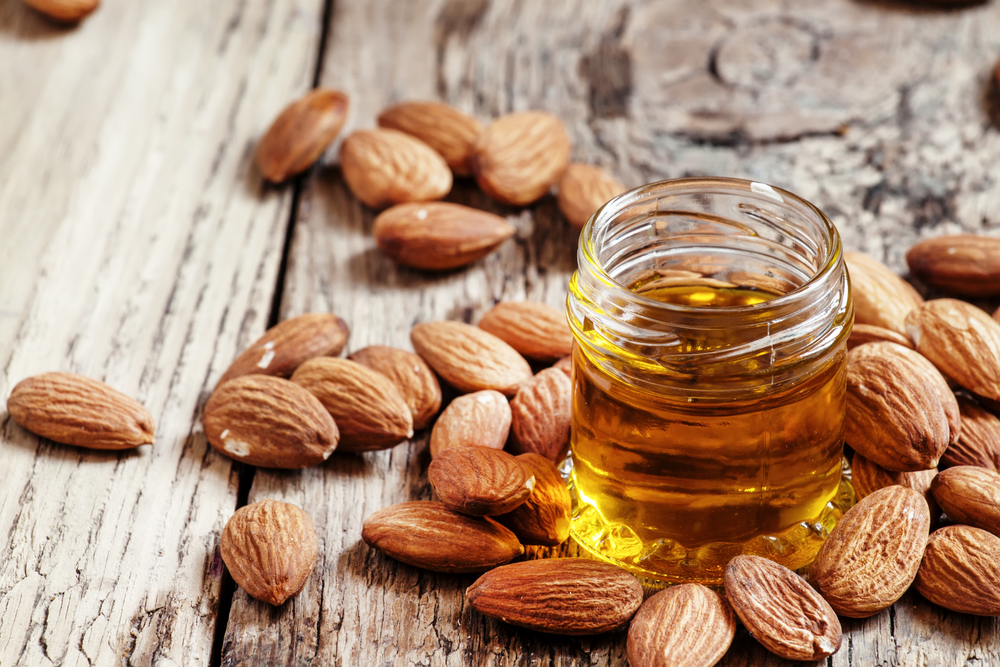
The good fats contained in almonds are beneficial for skin health. They are rich in antioxidants too.
A 2019 study examined the effects of almond intake on facial sebum production and wrinkles. (8)
Over 16 weeks, the participants who consumed 20% of their daily energy requirements from almonds reduced their wrinkle severity and width compared to the control group who ate calorie-matching snacks.
Summary: Regulr consumption of almonds offer anti-aging benefits with a notable reduction in the formation of wrinkles.
9. Almonds May Reduce the Risk of Pancreatic Cancer
Regularly eating nuts such as almonds can lower your risk of pancreatic cancer.
Researchers investigated the association between nut consumption and pancreatic cancer in women (without a history of cancer) (9).
It was observed that those who ate at least an ounce of nuts at least 2 times a week or more had a significantly lower risk of pancreatic cancer as compared to those who did not eat nuts.
Summary: Repeated nut consumption is inversely related to the risk of pancreatic cancer. .
10. Positive Dietary Impact of Daily Almond Intake

Researchers evaluated the long-term supplementation of almonds (52 grams/day) in healthy men and women for a period of 6 months. (10)
The following changes were noted in their dietary intake at the end of 6 months:
- Healthy fats (monounsaturated and polyunsaturated fats) increased by 42 and 24%
- Fiber, vegetable protein, and vitamins increased by 12, 19, and 66%
- Copper and magnesium significantly increased by 15 and 23%
- Trans fat intake and animal protein had notably reduced by 14 and 9%
- Sodium, cholesterol, and sugars decreased by 21, 17, and 13%
These sets of changes were similar to dietary recommendations known to prevent cardiovascular and other long-term diseases.
Summary: The intake of almonds offer significant health benefits due to higher intake of healthy fats, proteins, vitamins, and minerals such as copper and magnesium.
The Side Effects Of Almonds
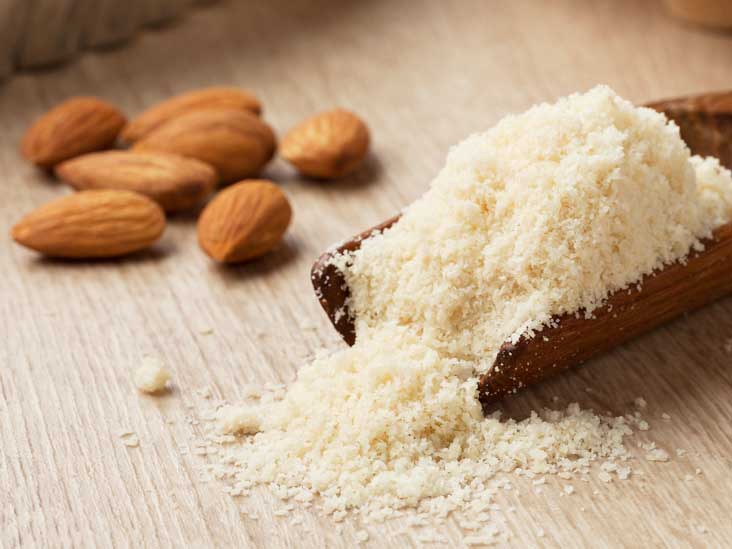
Small quantities of almonds do not pose any side effects. However, overeating this nutritious nut create mild to moderate gastrointestinal problems. Allergies to almonds can be more dangerous, so practice caution when trying it out the first time.
Nausea, diarrhea, constipation, and abdominal pain are some of the side effects associated with almond overeating. You will gain weight if you do not practice moderation.
About 10 to 15 almonds a day are ideal to experience the benefits without worrying about side effects.
3 Quick and Easy Home-Made Almond Recipes
1. Almond Cracker

The almond cracker recipe has only a few ingredients, which are whole almonds, one egg, cashews, and salt. No flour is required. Chia seeds can be added if preferred. The cracker is packed with proteins and no gluten is present. A nutritious alternative to flour crackers.
All you need to do is blend the almonds, and cashew, then add the egg and salt. Roll out the dough and keep it paper-thin. Cut out squares and bake them only for 10 minutes. You and your family and friends will be crackling up on crisp and flavorful crackers in no time.
2. Almond Chocolate Cake

For the almond chocolate cake, you would use ground almonds and maple syrup in place of sugar. In the absence of a food processor, you can use almond flour or almond meal. The steps involved are:
1. Melt the butter, chocolate, and maple syrup together
2. Add the egg, almond meal, and cinnamon and give a mix
3. Grease 5-inch ramekins, pour them in, and bake them for 35 minutes
4. Allow cooling and sugar-dust the sumptuous cake
You can serve it with ice cream.
3. Almond Butter
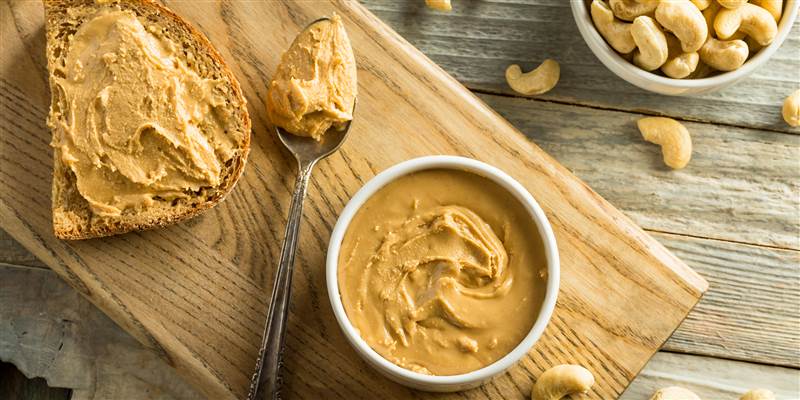
It is very easy to make. The almond butter can be stored for up to a month by keeping it in a cool and dry place. It can be used for more than 3 months if refrigerated. Refrigeration can make it thick.
You would have to first roast the almond nuts in the oven and blend them in a food processor. It would take some time as it would first get crumbled, turn gooey, and then creamy which is the right texture as butter.
You can use it on toast with berries and drizzled honey. It can be spread on banana bread muffins. Swirl it with yogurt and roasted strawberries for a filling snack.
The Final Note
Almond is a versatile ingredient that can be added to sweet and savory dishes. Almond flour is very popular in keto diets.
I love adding chopped almonds on top of my morning oatmeal. Almonds add a nice crunch to salads.
There is no doubt that almond is a densely packed nutrient that can be consumed anytime during the day.
The health benefits are varied and this tree nut can be consumed by the old and young alike. The side effects are restricted to too much consumption or allergic reactions, which are easily avoidable.
Packed with antioxidants, healthy fatty acids, minerals, and vitamins, this nut can be considered as a perfect food.
